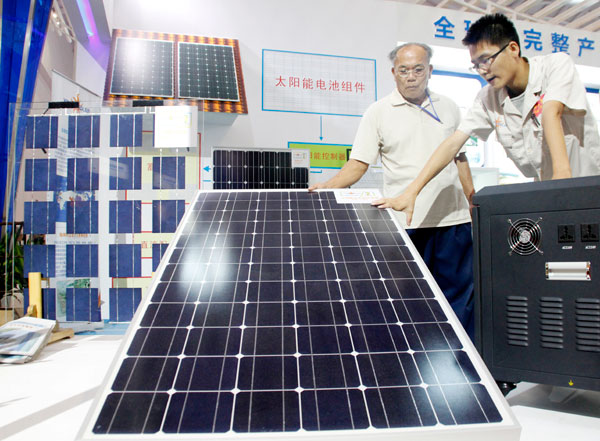Warning on EC solar move
Updated: 2013-05-08 00:32
By Fu Jing and Tuo Yannan in Brussels and Ding Qingfen in Beijing (China Daily)
|
||||||||
European Trade Commissioner's decision on tariffs expected on Wednesday
 |
|
Solar panels on display at an expo in Haikou, Hainan province. A Ministry of Commerce official said the European Commission has been using the solar panel case as a bargaining chip to seek compromise from China in specific sectors, such as telecoms. Shi Yan / For China Daily |
China has warned the European Commission against taking any risky decisions in its handling of the ongoing multi-billion-euro anti-dumping and subsidies case involving China's solar panel exports to Europe.
European Trade Commissioner Karel De Gucht is expected to propose to the commission on Wednesday that it impose anti-dumping duties on Chinese photovoltaic imports, while downstream business representatives in Europe are reported to be strongly against such proposals.
The levies are likely to be set at 40 percent or higher and could come into force as soon as June 6, reports have suggested. The duties would be imposed for up to five years.
The Alliance for Affordable Solar Energy has warned of severe job losses as a result, and industry insiders have suggested any penalty tariff higher than 30 percent will cause considerable damage to the European and Chinese solar industries.
Chinese government officials said they have not been informed by their counterparts in Brussels of the likely decision, but warned if such measures are taken, it will represent a "threat" to China, because of the huge impact on the country's 500 solar panel producers.
They added that such a move will also affect those in the global solar panel value chain, with 265,000 jobs in the downstream industry in the EU possibly affected.
"Brussels should be cautious on the final decision it makes as any result, if not positive, would hurt China-EU economic relations and bilateral trade," said an official from the Bureau of Fair Trade for Imports and Exports with the Ministry of Commerce, who declined to be named.
Another official, from the General Office of the Ministry of Commerce, added that Brussels has been very aggressive in its stance on the case.
On De Gucht's likely announcement on Wednesday, the official added: "We cannot confirm anything yet, but we believe it is likely to be a threat to China."
The official added the EC has been using the solar panel case as a bargaining chip to look for compromise from China in other sectors such as telecoms.
In an e-mail response to China Daily, De Gucht's spokesman, John Clancy, said that under European Union and World Trade Organization rules, he is not permitted to comment on an ongoing investigation.
Last year, the EU announced it will launch anti-dumping and anti-subsidies investigations into Chinese solar panel manufacturers.
Jodie Roussell, Public Affair Director of Trina Solar Europe, warned officials in Brussels that the solar industry is very global and competitive, and that the EC's decisions to increase tariffs may have a direct effect on European jobs.
About 1,000 European downstream and upstream enterprises have signed two letters, which have been obtained by China Daily, and sent to De Gucht requesting him to protect European jobs amid tough economic conditions.
Some industry sources said China agreed to grant 250 million euros in loans in January to help build dozens of solar power plants in Greece, an initiative that may bring thousands of green jobs to the country.
"But China's banks are hesitating (to provide the funds) because of the mounting uncertainties in Brussels," said the representative of one Chinese solar company based in Brussels.
Colin Yang, vice-president of public affairs at Trina Solar Ltd, a Chinese manufacturer of photovoltaic modules in Jiangsu province, said new EU regulations which came into force in March, requiring all Chinese photovoltaic products to be registered, have already caused damage to his and other European companies.
Graham Watson, a member of the European Parliament, suggested that the global solar industry should stand together to form a world body that can communicate and negotiate better as an industry.
"We need to avoid the kind of tensions that we saw in the semi-conductor industry.
"Then, we set up a global semi-conductor council - so let's set up one for the global solar panel industry, which could help drive its own way forward," said Watson.

 Michelle lays roses at site along Berlin Wall
Michelle lays roses at site along Berlin Wall
 Historic space lecture in Tiangong-1 commences
Historic space lecture in Tiangong-1 commences
 'Sopranos' Star James Gandolfini dead at 51
'Sopranos' Star James Gandolfini dead at 51
 UN: Number of refugees hits 18-year high
UN: Number of refugees hits 18-year high
 Slide: Jet exercises from aircraft carrier
Slide: Jet exercises from aircraft carrier
 Talks establish fishery hotline
Talks establish fishery hotline
 Foreign buyers eye Chinese drones
Foreign buyers eye Chinese drones
 UN chief hails China's peacekeepers
UN chief hails China's peacekeepers
Most Viewed
Editor's Picks

|

|

|

|

|

|
Today's Top News
Shenzhou X astronaut gives lecture today
US told to reassess duties on Chinese paper
Chinese seek greater share of satellite market
Russia rejects Obama's nuke cut proposal
US immigration bill sees Senate breakthrough
Brazilian cities revoke fare hikes
Moody's warns on China's local govt debt
Air quality in major cities drops in May
US Weekly

|

|







